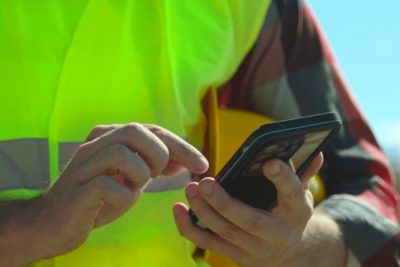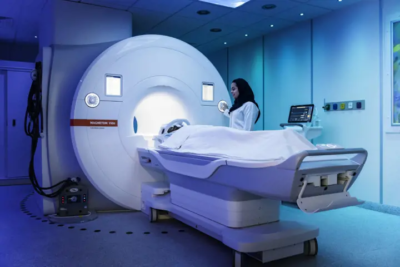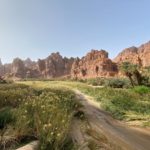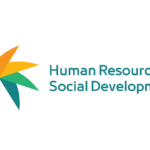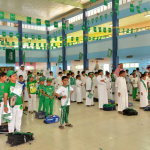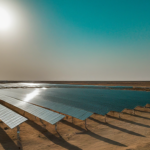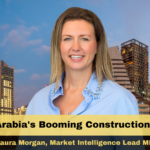
“We go where the money is and where the deals are. We have a lot of faith in Saudi.”
Mohammed Alhassan, co-founder of Gulf Islamic Investments LLC, a financial services firm that oversees nearly $2 billion. The firm plans to buy a stake in a Saudi health-care company for around $600 million, and is looking to plow around $1 billion into the kingdom over the next year to 18 months, with investments also targeted at logistics and cloud kitchens. [Bloomberg]

“It’s a new country. It is a country in the making.” [What has happened over the past 20 years in Saudi Arabia has amounted to] “a major cleanup of extremism… and it has not been easy.”
-Raghida Dergham, founder of the Beirut Institute think tank. [Associated Press]

“The agreement would result in unlocking cash invested in the fixed assets of the company, and this liquidity may be used to pay down debt which would reduce financial charges.”
–Muhammad Faisal Potrik, head of research at Riyad Capital, in comments to Bloomberg about Saudi Arabia’s PIF reportedly making a $484 million bid for a controlling stake in Zain’s mobile phone towers. There would be a corresponding rise in annual lease payments for these towers, but the net impact is expected to be “positive” for Zain Saudi, he said. [Bloomberg]

“Previously, debt restructurings were extremely difficult to achieve and there were no clear instructions of how insolvency should be treated.”
-James Swanston, a Middle East and North Africa economist at Capital Economics, in a research note discussing the recent debt restructuring deal involving one of Saudi Arabia’s largest conglomerates, Ahmad Hamad Algosaibi and Brothers. The deal is a sign that government reforms are working, Swanston said. [Zawya]

“I think we need to be reassured about American commitment…That looks like, for example, not withdrawing Patriot missiles from Saudi Arabia at a time when Saudi Arabia is the victim of missile attacks and drone attacks — not just from Yemen, but from Iran.”
–Prince Turki Al-Faisal, Saudi Arabia’s former intelligence chief and ambassador to the United States, in comments to CNBC’s Hadley Gamble last month. Saudi Arabia wants the U.S. to show that Washington is committed to the kingdom, and that means leaving American defense equipment in Saudi Arabia. [CNBC]

“We’ve introduced [banking] in Saudi. Although Saudi is, to all intents and purposes, a street circuit that’s going to be utilizing the Corniche in Jeddah, there’s quite a lot of unique circuit being built to tie it all together, and there’s a lovely banked corner at the end of the circuit, which looks pretty impressive.”
-Ross Brawn, Formula 1’s Managing Director of Motorsports, in comments discussing Saudi Arabia’s F1 circuit. “One of the big talking points after the return of the Dutch Grand Prix was Zandvoort’s dramatic new banked corners,” forumula1.com reports. Brawn believes that the banking’s popularity with the drivers justified the creation of similar style corners at the Abu Dhabi and Saudi Arabia tracks, which will appear on the calendar later this year. [formula1.com]

“I think the largest barrier to entry for a lot of companies right now in Saudi Arabia, and other parts of the GCC, is the cost of setting up, registering, and licensing a business. The cost of taking off space can be expensive, and the cost of trademarking in Saudi Arabia, and also in the UAE, is one of the highest in the world.”
Sophie Smith, co-founder and CEO of UAE-based femtech Nabta Health that provides diagnostic services for women about their fertility and overall health. [Wamda]

“Because of the high Saudi OSPs in previous months, traders have diverted to the spot market instead of using long term contracts…With domestic demand likely leveling off in autumn, they have more barrels to be exported, so that’s another reason to offer more attractive OSPs.”
-Giovanni Staunovo, a commodities analyst at UBS Group AG, in comments to Bloomberg. Now Aramco wants buyers to take more Saudi crude, he said. [Bloomberg]

“I’m very close to the crown princes of both Saudi Arabia and the United Arab Emirates and I share the values of their leadership. Mohammed bin Salman knows that he has done some unwise things and he has been over-zealous but he is doing something transformative to his country. He’s a game-changer, and has taken huge personal risks to implement his reform agenda.”
Thomas Kaplan, billionaire investor, philanthropist and owner of one of the world’s largest private collection of Dutch “Golden Age” paintings, including 17 works by Rembrandt, is planning a Rembrandt exhibition in Riyadh. [Financial Times]

“Between participation, high-profile events, tourism, and a healthy, active lifestyle agenda – all those points – work well with each other.”
-Charlie Beauchamp, Country Manager, CSM Sport & Entertainment. Sports’ contribution Saudi Arabia’s GDP grew from $640m in 2016 to $1.7bn in 2019, the most recent year for which sector-specific data is available. That figure is expected to grow to $4.8bn by 2030, according to the Ministry of Sports. [Arabian Business]

